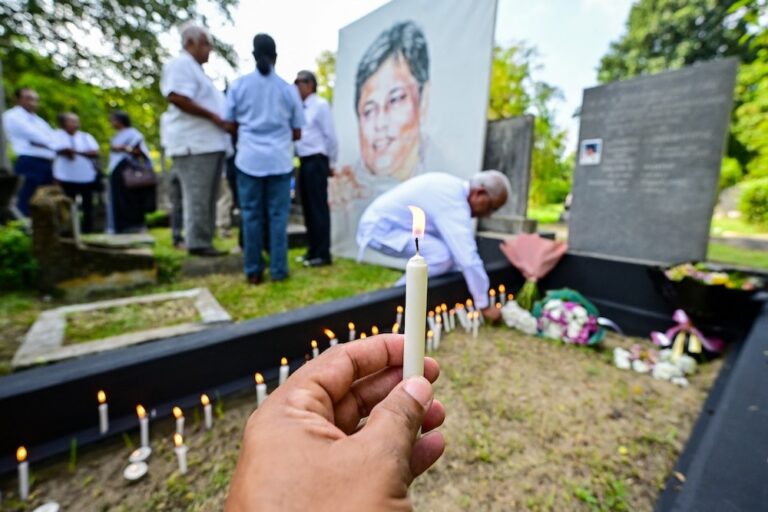(FMM/IFEX) – The following is an FMM press release: Sri Lankan Defense Secretary openly states he is in favour of draconian censorship and criminalising defamation 27th January 2008, Colombo, Sri Lanka – The FMM is appalled to learn that the brother of the Sri Lankan President, Defense Secretary Gotabhaya Rajapaksha, has openly stated that media […]
(FMM/IFEX) – The following is an FMM press release:
Sri Lankan Defense Secretary openly states he is in favour of draconian censorship and criminalising defamation
27th January 2008, Colombo, Sri Lanka – The FMM is appalled to learn that the brother of the Sri Lankan President, Defense Secretary Gotabhaya Rajapaksha, has openly stated that media has to be censored and that criminal punishment of defamation should be brought back. Rajapaksha also named two leading media institutions that, in his opinion, have to be prosecuted for their critical reportage.
Openly taking advantage of the spoils of nepotism, Rajapaksha demonstrated his utter and chilling disregard for media freedom in an interview published in “Sunday Lankadeepa”, a Sinhala newspaper with wide circulation. Here are the relevant passages of his interview, translated into English:
“I think that there is no need to report anything on the military. People do not want to know how many and what kind of arms we acquired. That is not media freedom. I say without fear that if I have the power I will not allow any of these things to be written. I told the President that we need to exercise press censorship from the beginning. I have been telling him that we need bring in laws that stipulate harsh punishments for such reporting. . . We need a criminal defamation law . . . This is not media freedom, although very few are doing this. Today, ‘media freedom’ is being abused by two or three persons, isn’t it? Ranjith Wijewardane [proprietor of the Wijeya group, the largest privately owned newspaper group] and Maharaja [proprietor of largest privately owned electronic media group] have some other concept of media freedom. Only those two institutions want such ‘freedom’. Everything in this country has become prostituted; like peace, the media is completely prostituted.”
Given that the Defense Secretary is a government servant and the brother of the President, and given that to date there has not been any mitigating statement made by the government or the President, the FMM considers these remarks to reflect the position of the government vis-à-vis media freedom in Sri Lanka. Needless to say, this ridicules tired pronouncements by the Media Minister that there is media freedom and no censorship in Sri Lanka.
The FMM fears that this chilling warning from a Defense Secretary with unbridled power but without, evidently, sound judgment, is a significant threat to freedom of expression and media freedom in Sri Lanka. In many ways, the government’s deplorable attitude towards media freedom perfectly mirrors that of the Liberation Tigers of Tamil Eelam (LTTE) rebels they are fighting against.
The FMM unequivocally condemns this latest public statement by the Defense Secretary. It is axiomatic that, if a just peace is to be secured in Sri Lanka, media must be allowed to report on the excesses of war in the public interest. Those who do not toe the line of government are now targets for assassination and physical harm, evidenced by the recent brutal attack against a journalist with the state television broadcaster who stood up against the brutish mindlessness of senior government MP, Mervyn Silva, in December 2007. Given that no disciplinary action whatsoever has been taken to date against Silva, despite repeated calls by the public and media, the FMM firmly believes that the government is, in fact, openly targeting journalists and media personnel who are critical of it, and that it is doing so with complete impunity.
This is an untenable situation and the FMM asks the government urgently to clarify the Defense Secretary’s comments, mindful of the fact that the all-consuming war against the LTTE is eroding what is left of media freedom in Sri Lanka daily. Soon, the only journalists left will be those who are unwilling and unable to write anything that holds public officials and government policy to scrutiny.


